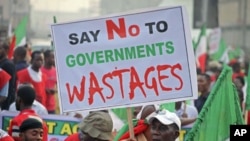Mass strikes and protests against the end of a consumer fuel subsidy took place as planned Monday in Nigeria, despite an emergency session held in the House of Representatives on Sunday to avert the economic shutdown. The protests sparked clashes with police that have killed at least three people.
Thousands across Nigeria observed the beginning of an indefinite strike called by Nigerian unions to pressure the government to reinstate the subsidy, which many Nigerians saw as the only benefit they received from the country's oil wealth.
Delta State University lecturer Julia Obgede participated in the protest in Warri, where President Goodluck Jonathan has enjoyed popularity in the past.
“So we are seeing the government as very, very mean. Not just insensitive, but mean and wicked to people, after we have supported him so much. I am ready anywhere, any time, so to hell with Jonathan,” said Obgede.
Like most protest, the Warri event was peaceful, although 18 people were reported injured in Kano when police opened fire on a protest there.
In addition to an increased security risk, the strikes threaten to hurt the economy as well. In an effort to avoid any impact, the House of Representatives held a special session and produced a motion asking the federal government to reinstate the popular fuel subsidy. The majority of legislators cast votes in line with popular opinion, and heckled those who defended the removal during the rowdy session.
Representative Samson Osagie does not oppose deregulation through the subsidy removal, but he said that with rampant poverty and a growing sectarian conflict, now is not the time to raise fuel prices.
"You must first of all have a country that is united, strong and alive before you can talk of economic policies. The truth of the matter is that this is a country that is on the brink of collapse - socially, economically and otherwise. Imposing additional economic hardship at this point in time, when people are killing, it is very ominous," said Osagie.
The Jonathan government says the fuel subsidy was a sink of corruption that consumed 25 percent of the national budget. It has not, so far, responded to the House's motion.
Opponents say the government should punish those who abused the system, not the general public.
Dino Melaye is a former member of the House of Representatives and the leader of Occupy Nigeria, a group that has been camping in the streets in the style of the U.S. Occupy movement.
"What we are losing to corruption in this country is about three times what we are losing to the subsidy. So let the president fight corruption and ameliorate the loopholes in government," said Melaye.
Central to the subsidy issue is Nigeria's inability to refine the 2 million barrels of oil it produces daily. The government says it can no longer afford to subsidize the refined fuel it imports and estimates it will save more than $7 billion this year, which it says will reinvest in the country's infrastructure, including oil refineries.
